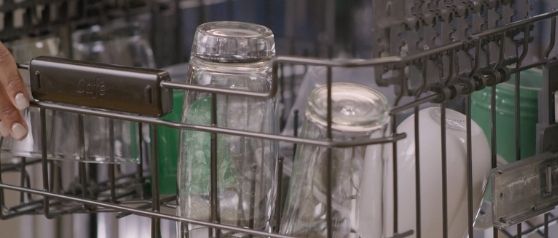Cascade Platinum Plus ActionPacs™ - Fresh Scent
How Do I Remove Hard Water Stains Caused by the Dishwasher?

If you have a dishwasher leaving residue on clean dishes, it’s probably hard water. It's one of the leading causes of white, cloudy film on your dishes and glasses. In the past, detergents used phosphates to help counteract hard water staining, but because of the environmental impact, all of our products are phosphate-free.
What should I do if I have hard water?
All of our dish products are designed to work effectively in all kinds of water hardness. Our dishwasher pacs, like Cascade Platinum Plus ActionPacs™, are formulated with water softeners to help prevent hard water deposits on your dishes—and, as always, are the perfect dose.
What is the cloudy stuff on our glasses and dishes? Is it still safe to eat and drink from them?
When your dishwasher leaves film on clean dishes, it's natural to wonder if it's safe to use them. The film forms when detergent combines with water hardness, and is mainly made up of magnesium, calcium, and aluminum—elements commonly found in many of the foods we eat. Still, we recommend that you wash residue off of dishes before using them.
How can I prevent filming on glasses and dishes?
If you’re using Cascade and notice that your dishes look filmy after they’ve been cleaned, consider switching to Cascade ActionPacs™. They’re complete unit doses, which means they have everything you need in one. If you prefer powders or gels, make sure you fill your detergent chamber(s) completely and properly. Hot water helps prevent spotting, so double-check that your dishwasher is washing with water that is at least 120°F (check your water heater). Run hot water at your kitchen sink before starting the dishwasher to help reach this temperature.
If you’re still experiencing filmy residue, you could have hard water. Use Cascade Power Dry Rinse Aid to help prevent spotting on glasses and dishes. Its sheeting action helps keep water from hanging onto your dishes—that way drops don't stick around and leave residue.
How can I remove hard water film that is already present?
For non-metal items, we recommend a vinegar wash. Put 2 cups of white vinegar in a bowl and place on bottom rack of the dishwasher. Run the glasses/dishes through a cycle with no detergent. Re-wash with Cascade Dishwasher Cleaner to remove residual vinegar.
For metal items, follow manufacturer’s suggestion for cleaning. We suggest cleaning by hand using a stainless steel cleaner for stainless steel items or silver cream for silver items.
Why choose Cascade for hard water marks and films?
Cascade Platinum Plus ActionPacs™ are a great detergent for hard water issues. They're formulated with a rinse aid that breaks water surface tension, helping to keep drops from clinging to your dishes and leaving deposits behind. Dishes come out cleaner, dry faster, and are virtually free of spots and streaks.
Sometimes water is hard, but solving such dish issues is easy with our dishwashing guide. Once you’ve explored it, no dishwashing problem will defeat you. Not sure how to clean stainless steel, glassware, silverware, or baby bottles? We’ve got handy-dandy guides on those common dish problems and more, too.
Recommended Articles
How To Prevent Spotty Glasses in the Dishwasher
Is your dishwasher leaving white spotty residue on your glasses? Learn how to remove spotty glasses and hard water marks in the dishwasher with these tips!
What Does Dishwasher Rinse Aid Do
Dishwasher rinse aid helps remove water from your dishes and combat water spots. Learn more about rinse aid and how it helps you clean your dishes better.
Dishwasher Not Cleaning Dishes Well?
Dishwasher not cleaning dishes as well as it could be? Use our troubleshooting guide and see what needs to be done.
